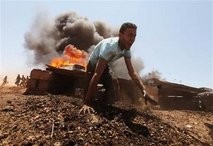NATO must broaden the range of targets it is bombing in Libya or risk failing to remove Muammar Gaddafi from power, Britain's most senior military officer was quoted as saying.
NATO warplanes, acting under a U.N. mandate to protect civilians, have stopped government troops advancing on rebel strongholds but the collapse of Gaddafi's rule, which many Western governments seek, has not materialized.
After a series of air strikes on his Bab al-Aziziyah compound in Tripoli, Gaddafi taunted the Western military alliance, saying in an audio recording aired on Friday that he was in a place where NATO could not reach him.

General David Richards, Britain's chief of defense staff, said the military campaign to date had been a "significant success" for NATO, but it needed to do more.
"If we do not up the ante now there is a risk that the conflict could result in Gaddafi clinging to power," he was quoted in Britain's Sunday Telegraph newspaper as saying.
"At present, NATO is not attacking infrastructure targets in Libya. But if we want to increase the pressure on Gaddafi's regime then we need to give serious consideration to increasing the range of targets we can hit," he said.
A spokesman for the Libyan government responded by saying that NATO had already gone beyond its mandate from the United Nations to protect civilians.
"They've already been targeting infrastructure," Khaled Kaim, who is also deputy foreign minister, told a news briefing.
"The interest here is Libyan oil, not protection. It should be called blood for oil, this is the proper name," Kaim said.
The Libyan official also hit out at the International Criminal Court (ICC), whose prosecutor has said he will request arrest warrants over the killing of civilian protesters, with Gaddafi and some of his sons likely targets.
"The practices of the ICC are questionable. It's a baby of the European Union designed for (prosecuting) African politicians and leaders," Kaim said.
Spanish radio, citing ICC sources, said on Friday the warrants would be requested on Monday.
STALEMATE
Three months after a revolt began against Gaddafi's four-decade rule, fighting between rebels and government forces on several fronts has come to a near-standstill and Gaddafi is refusing to bow to efforts to force him from power.
Thousands of people have been killed in the conflict in Libya, the bloodiest of the revolts which have convulsed the Middle East in what has been called the "Arab Spring."
Libyan officials deny killing civilians, saying instead they were forced to take action against criminal armed gangs and al Qaeda militants. They say the NATO campaign is an act of colonial aggression aimed at grabbing Libya's oil.
In the rebel-held city of Misrata, scene of some of the fiercest fighting in the conflict, rebels said they were braced for renewed attacks by forces loyal to Gaddafi.
"The (pro-Gaddafi) brigades still have military equipment enabling them to bombard any area in Misrata," a rebel spokesman called Abdelsalam said from the city. "The revolutionaries are in full control of the port but the danger is still there because the brigades have tanks and rocket-launchers."
Another rebel spokesman, Gemal Salem, said the city and its surrounding villages were now "fully under the control of the rebels from all sides including the air base."
In an address after prayers in Vatican City, Pope Benedict denounced the bloodshed in Libya and the killing of civilians, calling for negotiations and dialogue to prevail.
The uncertain direction of the Libya conflict poses a dilemma for Western governments. They face voters who are impatient for quick results and want to avoid a repeat of the long-drawn-out fighting in Iraq and Afghanistan.
An inconclusive outcome is likely to limit Libyan oil exports, keeping world prices high, and drive thousands more migrants to risk death crossing the Mediterranean to Europe.
Previous NATO bombing campaigns, especially in Kosovo in the late 1990s, showed that more aggressive targeting carries with it the risk of civilian casualties.
Libya on Saturday held a funeral for nine imams, or Muslim clerics, it said NATO killed in an air strike on the eastern city of Brega a day earlier. The alliance said the building it struck in Brega was a command-and-control-center.
A rebel spokesman called Abdulrahman in the town of Zintan, southwest of Tripoli, said NATO air strikes had hit targets in an area about 25 km (16 miles) east of Zintan.
Tunisia's state news agency reported that a boat arrived at the southeastern port of Zarzis carrying three officers who had defected from Gaddafi's security forces, joining several other Libyan officers who had arrived in Tunisia by boat in recent days, suggesting there were divisions in Gaddafi's ranks.
However, in Tripoli -- where foreign reporters operate under restrictions on their movement -- the outward signs were that Gaddafi's administration was holding firm.
Security officials in North Africa and elsewhere warn al Qaeda's north African branch could exploit the chaos of a long conflict in Libya to acquire weapons and recruit followers.
A Tunisian security official told Reuters on Sunday that two suspected al Qaeda members had been arrested near the border with Libya carrying an explosives belt and several bombs.
























